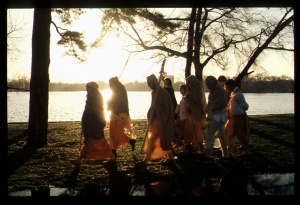SB 4.25.50: Difference between revisions
m (1 revision(s)) |
No edit summary |
||
| Line 1: | Line 1: | ||
{{info | {{info | ||
|speaker= | |speaker=Nārada Muni | ||
|listener=King | |listener=King Prācīnabarhiṣat | ||
}} | }} | ||
[[Category:Srimad-Bhagavatam - Canto 04 Chapter 25]] | |||
[[Category:Bhagavatam Verses Spoken by Narada Muni - Vanisource|042550]] | |||
<div style="float:left">'''[[Srimad-Bhagavatam]] - [[SB 4|Fourth Canto]] - [[SB 4.25: The Descriptions of the Characteristics of King Puranjana|Chapter 25: The Descriptions of the Characteristics of King Purañjana]]'''</div> | |||
<div style="float:right">[[File:Go-previous.png|link=SB 4.25.49]] '''[[SB 4.25.49]] - [[SB 4.25.51]]''' [[File:Go-next.png|link=SB 4.25.51]]</div> | |||
{{RandomImage}} | |||
==== TEXT 50 ==== | ==== TEXT 50 ==== | ||
<div | <div class="verse"> | ||
pitṛhūr nṛpa puryā dvār | :pitṛhūr nṛpa puryā dvār | ||
dakṣiṇena purañjanaḥ | :dakṣiṇena purañjanaḥ | ||
rāṣṭraṁ dakṣiṇa-pañcālaṁ | :rāṣṭraṁ dakṣiṇa-pañcālaṁ | ||
yāti śrutadharānvitaḥ | :yāti śrutadharānvitaḥ | ||
</div> | </div> | ||
| Line 16: | Line 22: | ||
==== SYNONYMS ==== | ==== SYNONYMS ==== | ||
<div | <div class="synonyms"> | ||
''pitṛhūḥ''—of the name Pitṛhū; ''nṛpa''—O King; ''puryāḥ''—of the city; ''dvāḥ''—gate; ''dakṣiṇena''—on the southern side; ''purañjanaḥ''—King Purañjana; ''rāṣṭram''—country; ''dakṣiṇa''—southern; ''pañcālam''—of the name Pañcāla; ''yāti''—used to go; ''śruta-dhara-anvitaḥ''—along with his friend Śrutadhara. | |||
</div> | </div> | ||
| Line 23: | Line 29: | ||
==== TRANSLATION ==== | ==== TRANSLATION ==== | ||
<div | <div class="translation"> | ||
The southern gate of the city was known as Pitṛhū, and through that gate King Purañjana used to visit the city named Dakṣiṇa-pañcāla, accompanied by his friend Śrutadhara. | The southern gate of the city was known as Pitṛhū, and through that gate King Purañjana used to visit the city named Dakṣiṇa-pañcāla, accompanied by his friend Śrutadhara. | ||
</div> | </div> | ||
| Line 30: | Line 36: | ||
==== PURPORT ==== | ==== PURPORT ==== | ||
<div | <div class="purport"> | ||
The right ear is used for karma-kāṇḍīya, or fruitive activities. As long as one is attached to the enjoyment of material resources, he hears from the right ear and uses the five senses to elevate himself to the higher planetary systems like Pitṛloka. Consequently, the right ear is here described as the Pitṛhū gate. | The right ear is used for ''karma-kāṇḍīya'', or fruitive activities. As long as one is attached to the enjoyment of material resources, he hears from the right ear and uses the five senses to elevate himself to the higher planetary systems like Pitṛloka. Consequently, the right ear is here described as the Pitṛhū gate. | ||
</div> | </div> | ||
__NOTOC__ | |||
<div style="float:right; clear:both;">[[File:Go-previous.png|link=SB 4.25.49]] '''[[SB 4.25.49]] - [[SB 4.25.51]]''' [[File:Go-next.png|link=SB 4.25.51]]</div> | |||
__NOTOC__ | |||
__NOEDITSECTION__ | |||
Revision as of 15:37, 28 May 2021

A.C. Bhaktivedanta Swami Prabhupada
TEXT 50
- pitṛhūr nṛpa puryā dvār
- dakṣiṇena purañjanaḥ
- rāṣṭraṁ dakṣiṇa-pañcālaṁ
- yāti śrutadharānvitaḥ
SYNONYMS
pitṛhūḥ—of the name Pitṛhū; nṛpa—O King; puryāḥ—of the city; dvāḥ—gate; dakṣiṇena—on the southern side; purañjanaḥ—King Purañjana; rāṣṭram—country; dakṣiṇa—southern; pañcālam—of the name Pañcāla; yāti—used to go; śruta-dhara-anvitaḥ—along with his friend Śrutadhara.
TRANSLATION
The southern gate of the city was known as Pitṛhū, and through that gate King Purañjana used to visit the city named Dakṣiṇa-pañcāla, accompanied by his friend Śrutadhara.
PURPORT
The right ear is used for karma-kāṇḍīya, or fruitive activities. As long as one is attached to the enjoyment of material resources, he hears from the right ear and uses the five senses to elevate himself to the higher planetary systems like Pitṛloka. Consequently, the right ear is here described as the Pitṛhū gate.